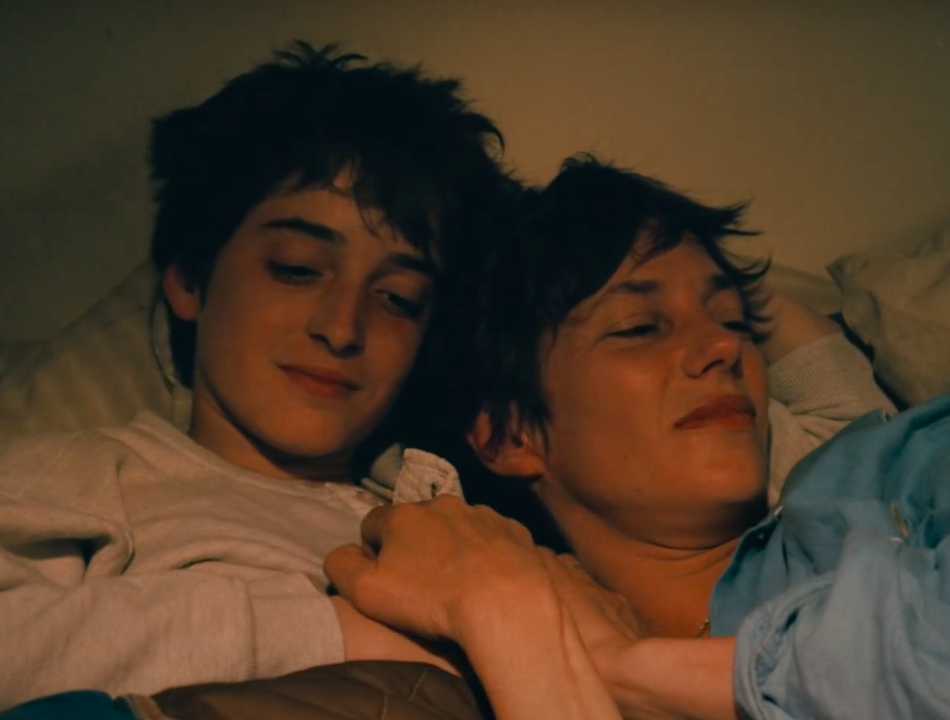
Mary-Jane, a lonely mother in her forties, gets absorbed in a sentimental affair with a 14-year-old boy.
“It’s a film in which all the younger actors are the children of the director and lead actress. It was like a picnic, you know?”
Agnès Varda
“Kung-fu master! grew out of an idea that Birkin had for a short story, one that she sketches out in Jane B. par Agnès V. (1988), about a woman, ‘whose life is devoid of love,’ falling for a barely teenage boy. Varda quickly wrote a script based on this concept; the resulting film fascinates not for its tale of scandalous intergenerational infatuation – aspects of which are, admittedly, quite poignant – but for being a stealth documentary about the young actors cast, who just happen to be Varda’s and Birkin’s own offspring. Charlotte Gainsbourg and her real-life younger half-sister Lou Doillon play, respectively, Lucy and Lou, the daughters of Birkin’s Mary-Jane, a lonely single mother who is seduced by Julien (Mathieu Demy, Varda’s son with Jacques Demy), Lucy’s fourteen-year-old classmate.
Kung-fu master! – the title refers to the name of Julien’s favorite arcade game – was not the first family film venture for either Charlotte or Mathieu. In 1986, the former acted opposite her father in Charlotte for Ever, a movie about an inappropriately attached dad and daughter that Serge also wrote and directed. (Two years earlier, a twelve-year-old Charlotte, wearing only a blue oxford and panties, lounged on a mattress with her shirtless père for his video of their duet ‘Lemon Incest.’) At the age of eight, Mathieu starred in his mother’s Los Angeles–set Documenteur (1981), a wrenching fictionalized account of Varda’s temporary separation from Jacques Demy. In Kung-fu master!, these young veterans of intensely personal projects – dramas that required them to reflect and refract not just their parents’ reality but their own – are all the more touching for the delight they seem to take, especially in their scenes together, at having the chance to play regular kids – even if ones advancing a highly unorthodox story. Unburdened by less overt autobiography, these enchanting adolescent actors, each the sole child of a legendary union, paradoxically appear most themselves.”
Melissa Anderson1
“What redeems this movie and allows it to work is that it is about feelings, not actions. Varda draws an invisible line at physical frankness in the film, so there is never a moment when we feel embarrassment for the characters (or the actors). The film really is about the phenomenon of the romantic crush - about how another person suddenly can seem to embody an ideal for us, especially if that person is distant enough or different enough so that we do not have to deal with their real-life situation. The crush also involves projection, as we see ourselves in the other person. And here perhaps the woman sees her own innocent idealism in the boy, and the boy identifies with her somewhat dreamy isolation. Apart from the difference in their ages, they really are well-suited to one another, at least as long as they can dream and are not distracted by pragmatic reality. Varda is one of the most individual and intriguing of contemporary French directors, in part because each of her films seems to satisfy a different need. Her masterful Vagabond (1985) was so different in tone from Kung-fu master! that it’s hard to believe they come from the same director. Vagabond told the story of an unhappy young woman who left her boring job for a carefree life on the road and gradually sank, one small step at a time, down the scale of social acceptability until she became a vagrant. That film suggested that we may all be closer to the gutter than we think, if we lose our discipline and our support systems. This one suggests we may all be closer to our ideal but impossible love, if we lose our fears.”
Roger Ebert2
- 1Melissa Anderson, “Melissa Anderson on Agnès Varda’s Jane B. par Agnès V. and Kung-Fu Master!,” Art Forum, 15 October, 2015.
- 2Roger Ebert, “Kung-fu master!,” rogerebert.com, 17 November, 1989.

